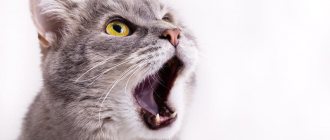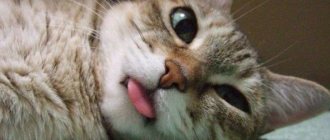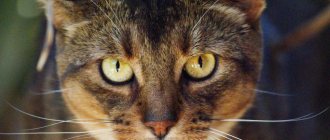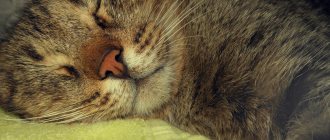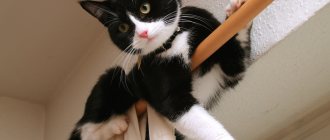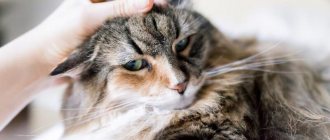We have already repeatedly examined all sorts of habits, instincts and subtleties of behavior of such domestic animals as cats. Today, almost most people have such pets at home, and therefore we are all interested in their habits from time to time. And below we will talk about why a cat sticks out its tongue.
Physiological reasons
Sometimes a protruding tongue is explained by simple physiology. In these cases there is nothing to worry about.
Washing
You can often see a cat sitting with its tongue hanging out after a long wash. Perhaps this is how she relaxes her muscles or meditates.
Relaxation
When a cat sleeps, the muscles of the tongue are relaxed and it naturally lengthens. Therefore, the animal’s mouth is half open and the tip of this muscular organ protrudes from it.
Stressful situations
Many animals, when in an excited state, are characterized by rapid breathing. The protruding tongue facilitates the passage of oxygen to the respiratory tract.
Overheat
Both dogs and cats, when they are hot, breathe heavily with their tongues hanging out. And this is a physiological norm - this is how they cool down. After all, they have practically no sweat glands; a small amount of them is located only on the pads of their paws.
Read also: Why do people need baby teeth?
Sexual rut
A protruding tongue can be seen in a male when he is excitedly “courting” a female, and this is also considered a physiological norm.
Childbirth
During the birth of kittens, the cat breathes heavily, constantly licks itself, forgetting to remove its tongue. At this point in her life, this is an absolutely normal sign, as she is very tense, tired, and may have a fever.
Nausea
Some pets get motion sickness from riding in a car. A sign of impending nausea and vomiting can be the tip of the tongue sticking out of the mouth.
The same situation occurs with a pet after anesthesia, for example, after sterilization or castration. But here general muscle weakness joins nausea.
Sounds
A certain frequency of vibration of sound waves causes reflex yawning and the effect of protruding the tongue in cats. For example, if you run your finger over the teeth of a fine-toothed comb or tear off some tape.
How to train?
- pre-bathe the kitten with shampoo (without conditioner), once it’s dry, sit it side by side - preferably on a litter, and while combing, communicate in a quiet and gentle voice - let it be pleasant;
- increase the time of toileting behind a fur coat gradually, avoiding the moment when the procedure ceases to be “a thrill”, so that he does not want to subsequently “beautify” with the help of the owner;
- choose the same time for care, forming an addiction to the daily routine; For those with a short coat, once a day is enough, and for those with a long coat, twice.
Any damage or inflammation of the skin is a contraindication for the procedure!
Health problems that cause cats to stick out their tongues and not put them away
Heart
The most dangerous health problem that causes cats to stick out their tongues is heart failure.
The tongue will stick out of the mouth after physical activity (games, hunting), stress or in the heat. The cat will breathe like a dog.
The mucous membranes of the oral cavity may be pale or bluish, or may be of normal color. This condition usually indicates feline hypertrophic cardiomyopathy. This disease requires patience from owners, since the animal will have to be given medications for the rest of its life and regularly visit a veterinary cardiologist.
Certain breeds of cats are prone to the disease - British, Scottish, Maine Coon and Siamese-Oriental breeds, but, unfortunately, any cat can get sick. It’s just that in these breeds, cardiac problems are registered somewhat more often and are inherited.
Virus
Another reason for protruding tongue is its swelling, which occurs with some viral diseases, for example, with rhinotracheitis and calicivirus, as well as with stomatitis and gingivitis.
These viral diseases are dangerous for kittens; adult animals get sick rarely and, as a rule, in a mild form.
You can’t do without a veterinarian: mild illness does not mean that the cat does not need treatment, and stomatitis and gingivitis will not go away on their own.
Trauma, neurology and pathological causes
It happens that cats get a jaw injury and cannot close their mouth. In addition to injury, this can result from damage to the nerve responsible for opening and closing the mouth, or to the central nervous system: cerebral stroke, poisoning.
With severe lesions, the cat will not be able to remove its tongue from its mouth when touched. A simple test will allow you to distinguish normality from pathology: if a cat can remove its tongue, it will definitely retract it, as soon as you put your finger on it. If it doesn’t work, it’s better not to delay your visit to the clinic.
Some representatives of brachycephalic breeds - British, Persian, Scottish - constantly stick out their tongues. Dishonest breeders claim that this is the breed norm, but no, this is a breed defect. The lower jaw of such a brood is too short, so not everything that should be in the mouth fits there.
In this case, you need to carefully monitor your teeth and visit the dentist: problems with bite often lead to the build-up of tartar, which can result in early tooth loss. From the reproduction of animals with malocclusion, it is concluded that this defect is inherited by the offspring.
Why are they?
Cat combs for combing fur were invented by man to keep a pet’s coat impeccably clean, beautiful and in order. And if a cat is taught from childhood to the procedure of combing (and also washing his eyes and cleaning his ears) with affection and play, then he will really love this care. And it will even ask itself!
But if you don’t teach it, then don’t be surprised. such a reaction:
This “brush” will “comb” anyone’s hair
Why do cats stick out their tongues?
In addition to hygiene, a cat's tongue is designed to draw in water (literally) and swallow food. You've probably heard that cats can have fur in their stomach. This is a consequence of grooming and it “haunts” all cats.
Since the cat understands that there is no need to swallow fur, but the structure of the tongue does not allow it to be spat out, a protruding tongue most often indicates an attempt to get rid of a foreign object in the mouth.
Most often, cats breathe with their mouth open and tongue hanging out when:
- Stress.
- Hot weather.
- In case of poisoning.
- For respiratory infections.
The cat accidentally stuck out its tongue
Situation: a cat is playing or washing itself, something attracts its attention, it freezes, but forgets to stick its tongue. At the same time, the expression on the pet’s face is “frozen” and confused.
The situation is absolutely typical and safe for a cat.
Research has shown that cats “forget to pick up their tongue” for a reason. There is a scientific explanation for this behavior and even a name - the Flemen reaction. The Flehmen reaction occurs when a cat is busy collecting and analyzing information from the environment, most often smell.
The molecules “stick” to the tongue, after which the information they carry is analyzed by the vomeronasal organ (Jacobson’s organ). Jacobson's organ helps a cat navigate its environment, but scientists believe that its main purpose is to detect and analyze pheromones (sex hormones).
Cat sticks out tongue in sleep
When the cat is completely relaxed, he may loosen his jaw causing the tip of his tongue to protrude from his mouth. This also happens during sleep. In brachycephalic cats (with flat faces), the tongue “falls out” more often.
The cat sticks out its tongue constantly
If your cat sticks out its tongue quickly and often, it is most likely trying to get rid of an unpleasant smell or taste. In case of suspicious behavior, you must:
- Sniff the cat's mouth - an unpleasant smell indicates problems with the teeth or digestive tract.
- Examine your teeth - you should be alert to dark spots, excessive tartar, food or foreign objects stuck between the teeth.
- Examine the gums for redness, hemorrhages, and injuries.
- The roof of the mouth and the area under the tongue - contact your veterinarian if you notice red spots or sores.
Cats, like humans, can develop dementia as they age. Frequent tongue protruding and a tongue constantly sticking out of the mouth (if there are front teeth) is considered one of the signs of age-related dementia.
The cat sticks out its tongue and drools
When a cat drools, it instinctively licks itself. Drooling may occur for the following reasons:
- Excitation. Many active cats drool during communication and petting - this is a variant of the norm.
- Dental diseases.
- Gum diseases.
There is another reason - improper functioning of the salivary glands. This happens in case of physical damage to the gland - a splinter, a puncture. Cats often injure their salivary glands if their food contains bones, especially fish bones.
Cat sticks out tongue due to pain or discomfort
Pain caused by gum or dental disease causes the cat to open its mouth and stick out its tongue. The most common oral diseases in cats are:
- Accumulation of tartar. Leads to periodontal disease and tooth decay. It can only be eliminated in a veterinary clinic.
- Plaque. Leads to the development of gum inflammation - gingivitis. To prevent plaque accumulation, cats prone to this disease need to brush their teeth regularly.
- Damage to bone and/or soft tissue of teeth. This condition is called periodontitis. Once bacteria enters the root of the tooth, a dental abscess develops. Periodontitis always develops if a cat breaks a tooth and does not receive the necessary help.
One of the most dangerous conditions is considered to be inflammation of the soft tissues of the mouth. This disease is called stomatitis, it is accompanied by a violation of the integrity of the tissues of the gums, tongue, cheeks and palate. With stomatitis, a cat drools, refuses to eat, keeps its tongue constantly sticking out, and has difficulty breathing because the tongue and throat swell.
Types of scratchers and how to choose
We choose depending on:
- intended for: combing wool, undercoat, tangles or fleas; trimmer; grooming; massage; for thinning and shortening;
- fur lengths for: fluffy long-haired, smooth-haired, wire-haired or short-haired species;
- breeds for: British, Scottish and medium breeds;
- devices: with rotating or sharpened or very frequent teeth; glove; mitten; comb-rake; metal;
- from the manufacturer: for example, Keller, Artero.
Warning signs
We must not forget that such actions by a cat can mean diseases of the respiratory system, oral cavity or other parts of the body. Only a veterinarian can accurately determine the cause of this behavior.
A cat may have a protruding tongue if he has sinusitis, rhinitis, or has contracted pneumonia. Such diseases can be dangerous not only for humans, but also for animals. Fluid flowing from the nose, heavy breathing and a protruding tongue can be prerequisites for the onset of health problems. You cannot start treatment on your own; your pet’s condition may worsen sharply.
When heart failure occurs, there is a lack of air in the body, which is also life-threatening. If the cat moves little and lies with its tongue hanging out, and its breathing is rare and labored, you should sound the alarm and go to the doctor. Even small deviations in the proper functioning of the heart will affect breathing, because these two systems are closely connected.
Foam vomiting, nausea, bloating, frequent coughing are likely prerequisites for poisoning.
You should pay attention to the following symptoms, if they occur, you should immediately contact the clinic:
- if the animal has difficulty breathing;
- sudden aggression;
- poor appetite, problems eating food;
- swollen mucous membranes.
Blood circulation may be impaired after injuries to the skull, jaw, infection or stroke. Most of these diseases do not go away without leaving a trace and limit the movement of certain muscles or the entire body.
A proper treatment program drawn up by a veterinarian will remove the remaining consequences of past diseases. Only those cats that are at an advanced age are less likely to recover
How often should you use a cat brush for grooming?
In order not to harm the health of the animal’s coat, it is important to know how often you can use the device for combing out fur:
- during shedding, the tool is used 2-3 times a week;
- for long-haired cats, procedures should be carried out 3-5 times a week;
- Smooth coat grooming is carried out 3 times a week.
Attention! If your pet's fur is too long, you should buy a special spray at the pet store that makes combing easier. After all, not a single brush will be able to comb out tangles efficiently and quickly if they are too hard and varied in shape.
If the animal bathes too often, after water procedures it is necessary to comb it to avoid tangling of hairs. How much does such a device cost? Typically, prices for combs vary between 100-500 rubles, which depends on the number of teeth and the purpose of the tool.
Briefly about the main types
COMB - with teeth of different heights and frequencies (must have blunt tips!) - available for any length; needed for untangling matted wool and tangles; and the flea comb has very frequent teeth.
A comb with rotating teeth is more effective than a simple one. But don't use it for
very long fur, because hairs can get wrapped up and be pulled out by the roots!
Slicker (slicker) is a “cruel” tool that tears out the undercoat! It is only used to raise the pile on the “pants”, “collar” and tail. Not for tangles and not for combing! But only for healthy and first combed wool with a sparse comb, and no more than twice a week during molting and once after it ends, and daily - it’s impossible!
The length of the teeth is more frequent and longer, the thicker the undercoat and the longer the guard hair. Not for short-haired people!
FURMINATOR is a favorite of cats and... a “jack of all trades”, because it combines: a simple comb, a comb for trimming (for manually removing undercoat), and a slicker brush; Available for different lengths of pile.
Operating principle: the fluff clings to the notches on the comb teeth and is brought out, while the guard hair does not cling and remains in place.
The undercoat is formed from 2-3 additional downy hairs growing from the same follicle as the guard hair. During molting, they die and fall out, and new ones grow in their place. The Furminator extracts dead and no longer needed fur “perfectly”!
MASSAGE - for smooth-haired species; combing out “pants” and “collar”, carefully unraveling tangles, helping with styling “hair” (Cornish Rex curls) and light massage (beneficial for skin health). The bristles can be: natural, plastic, metal (tips - only with protective droplets!). It’s more convenient not with a handle, but one that fits on your hand.
MITTEN or GLOVE - made of soft rubber or silicone; excellent removal of excess fluff; A massage session is similar to... caressing and stroking the owner
COLLUN CUTTER - only for combing (from top to bottom) in the area of the mat.
For short-haired representatives
Plush and thick wool, for example, the British shed heavily, for care you need:
- metal comb with frequent thick teeth;
- at the end of the procedure, use a natural brush (or rubber mitten).
- comb-comb;
- a brush with sparsely spaced bristles.
Bengal, toyger, ocicat should be combed 2-3 times a week, in the “arsenal”:
- metal comb with densely spaced thick teeth;
- then the mitten;
- At the end, wipe with a piece of suede for shine.
